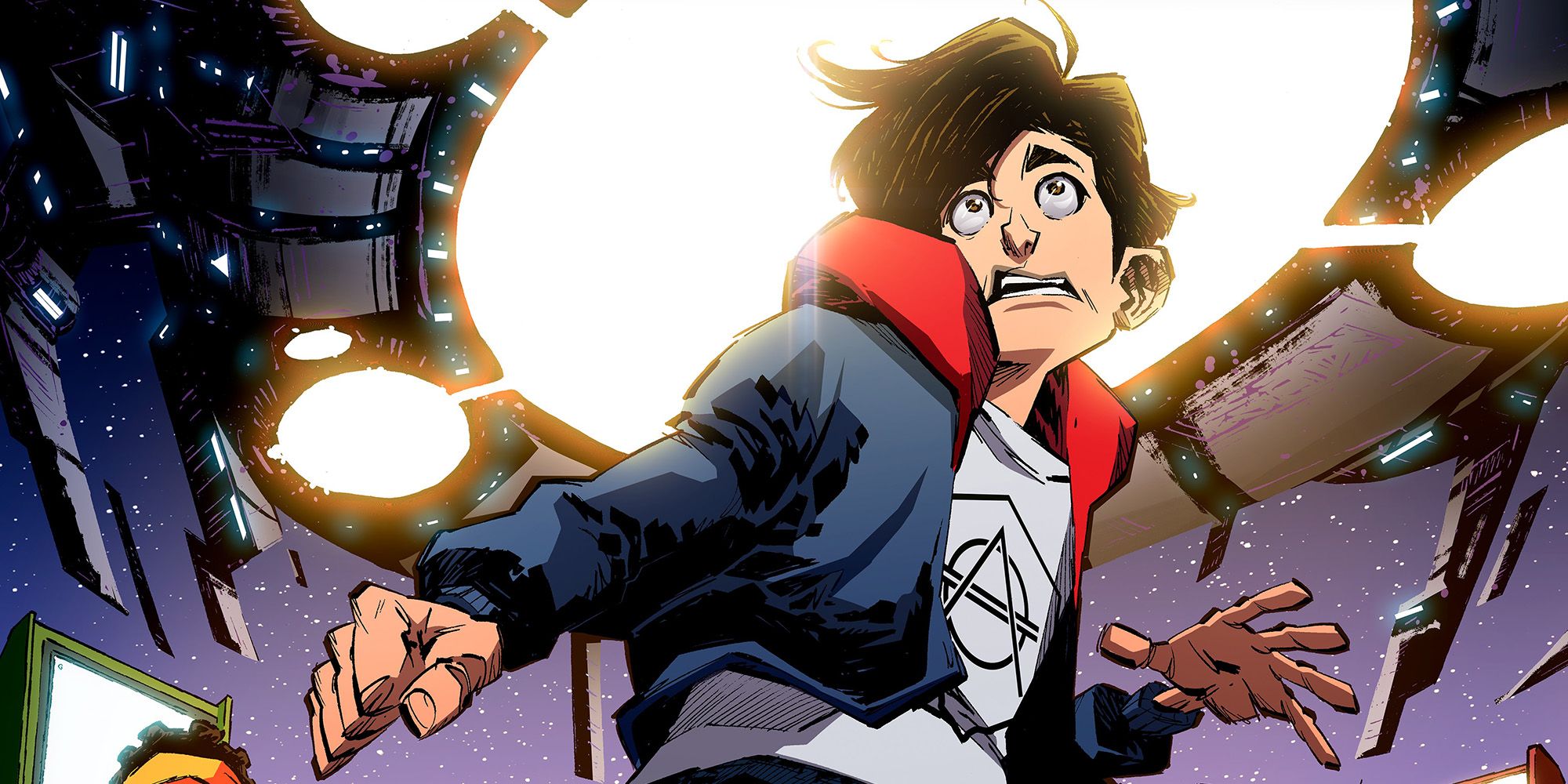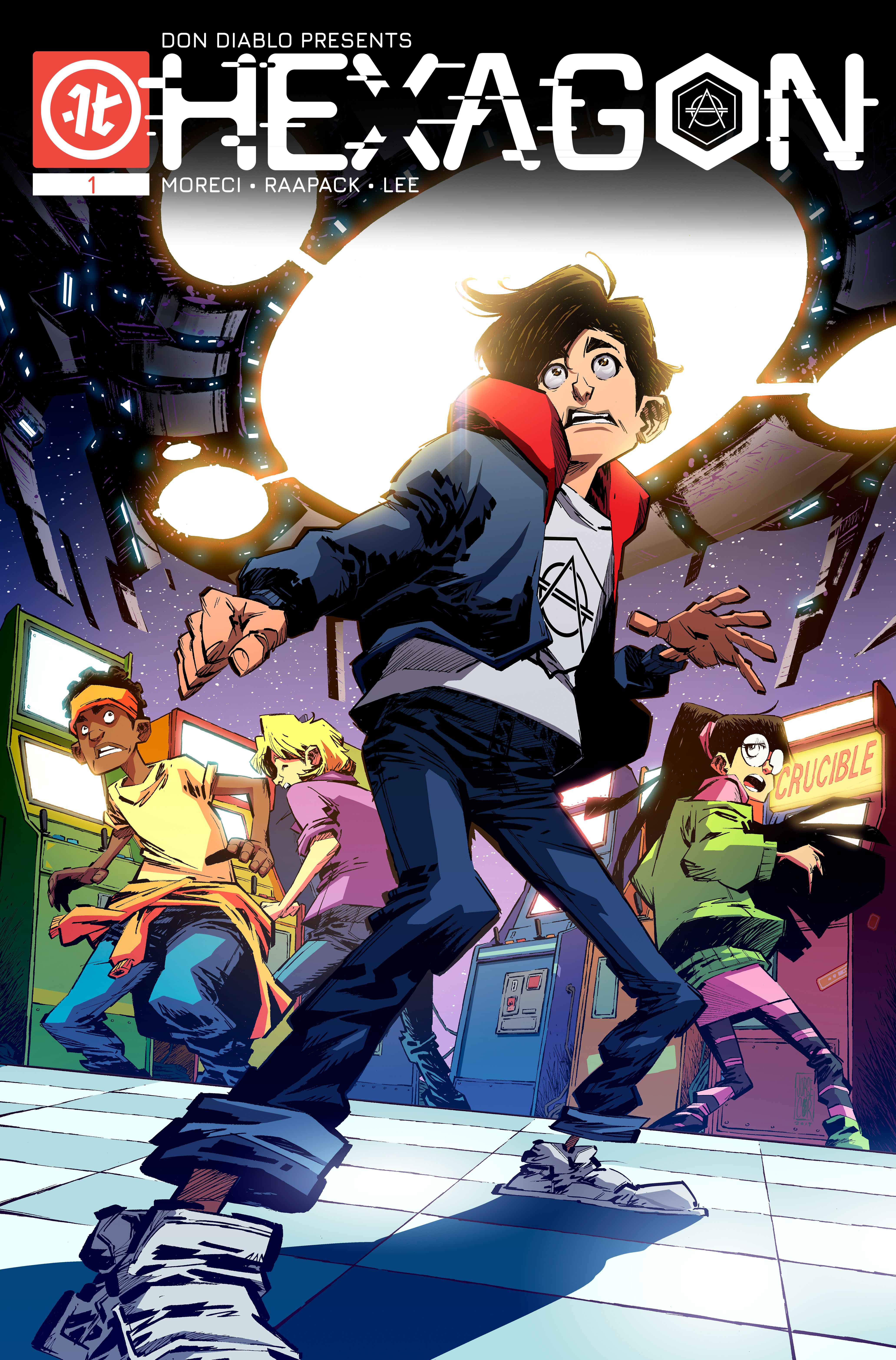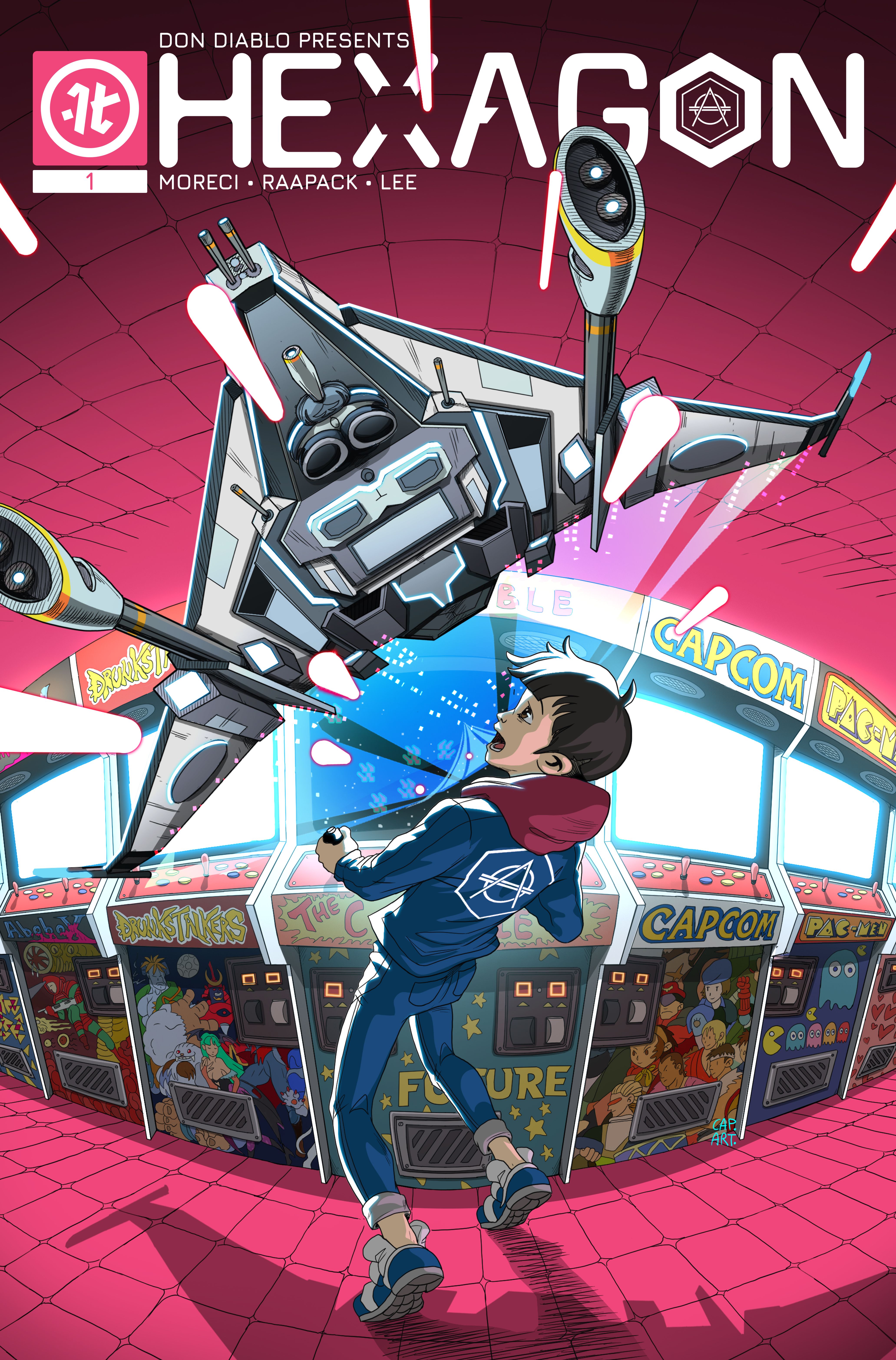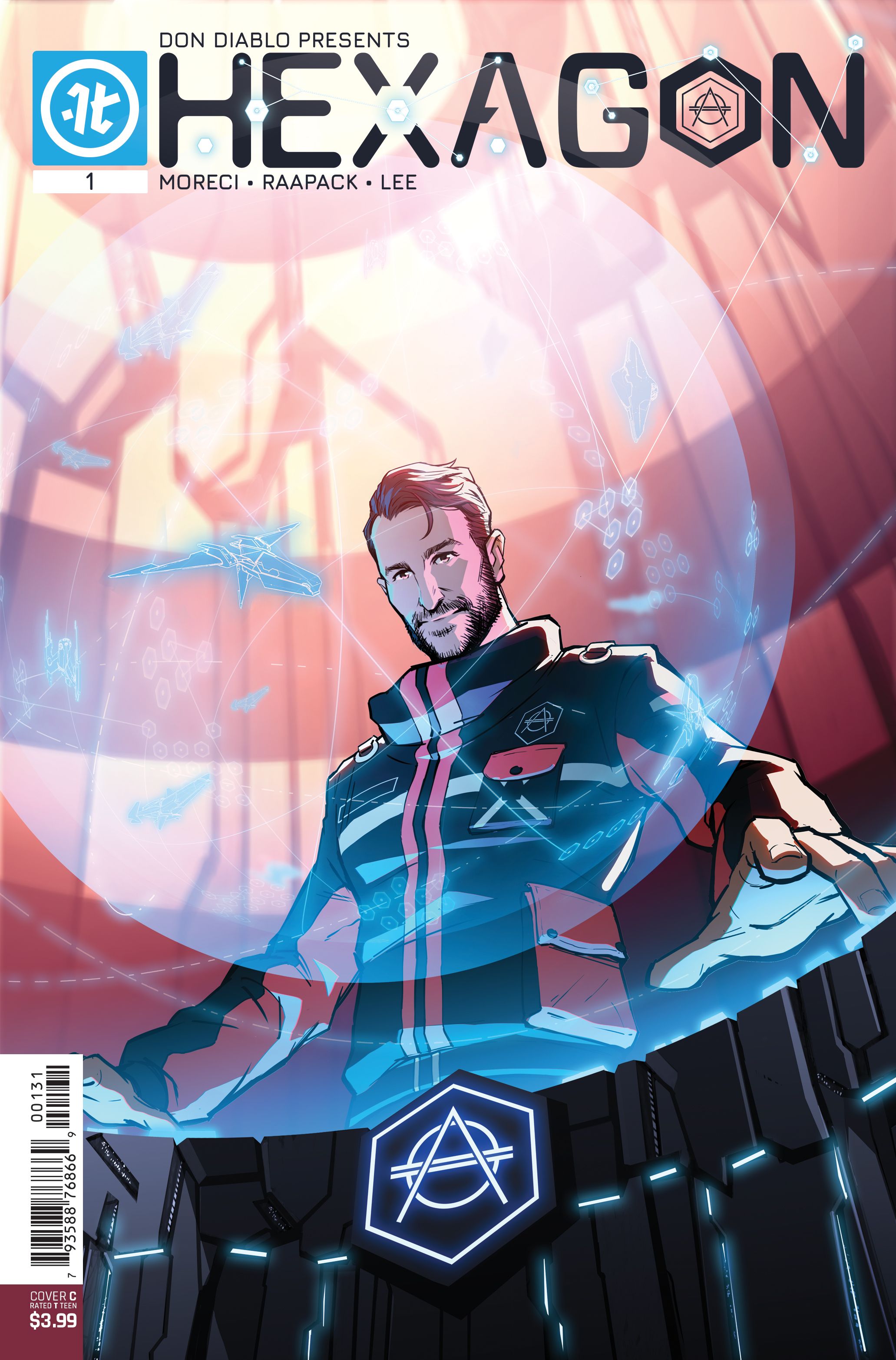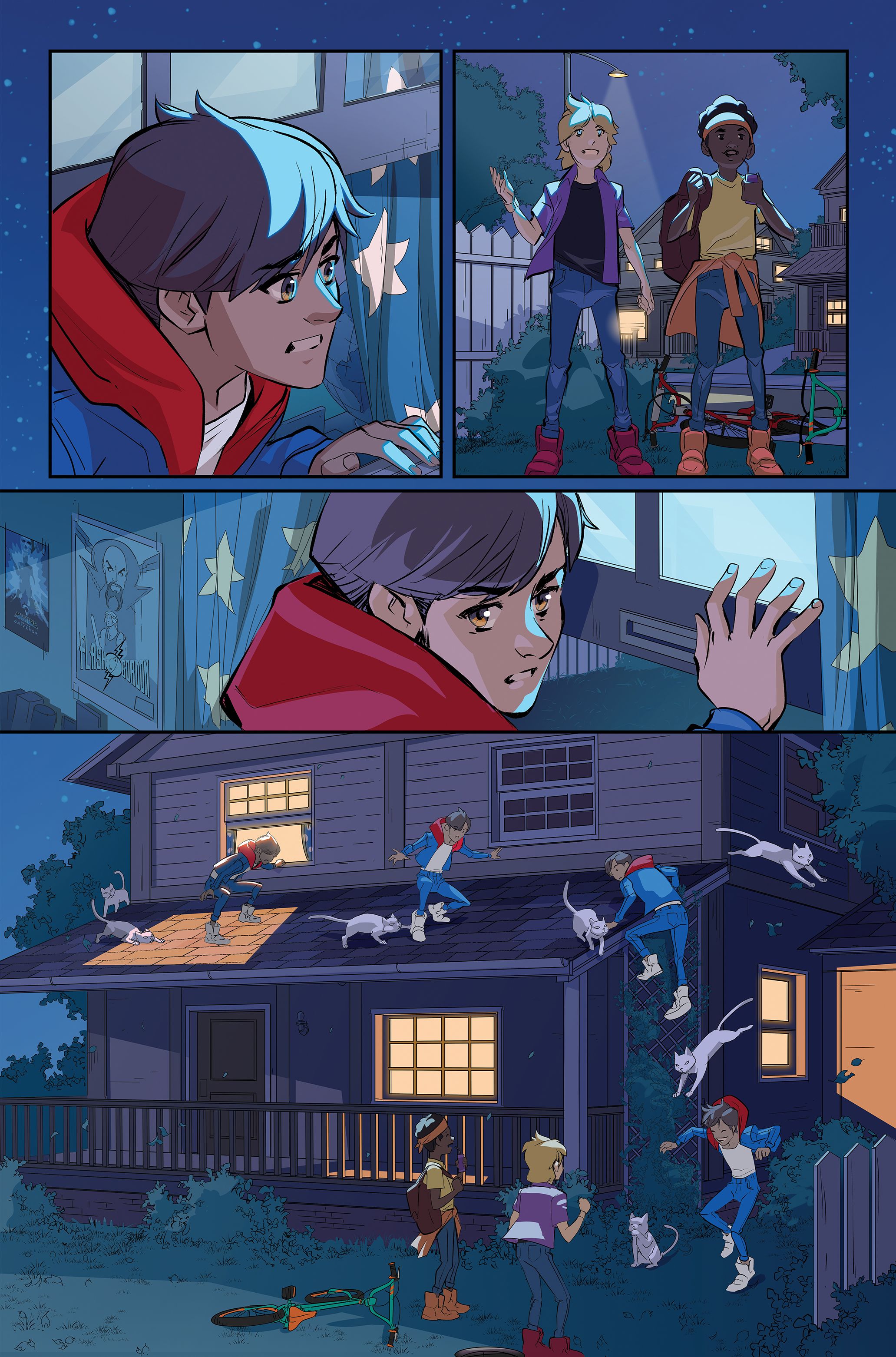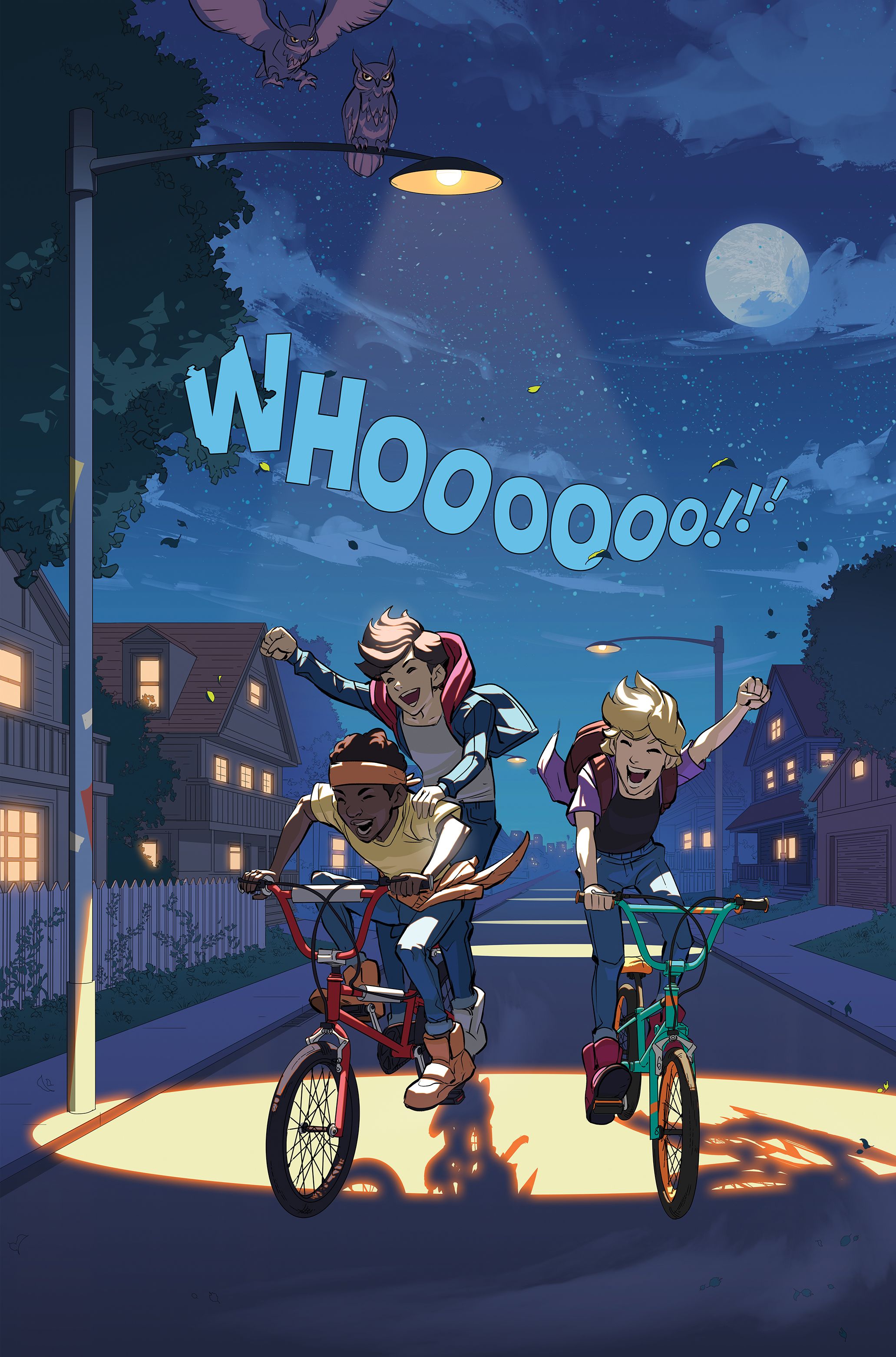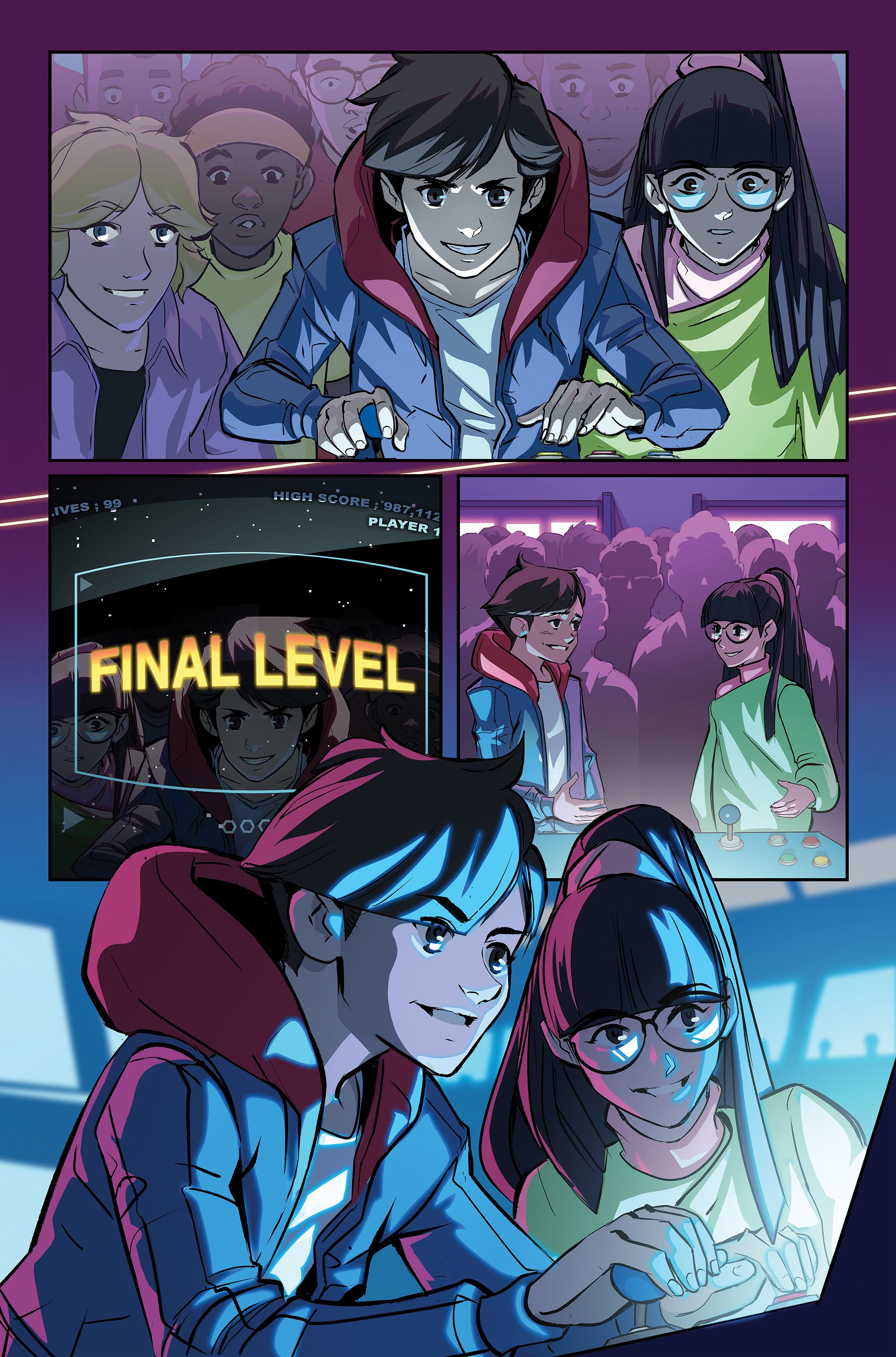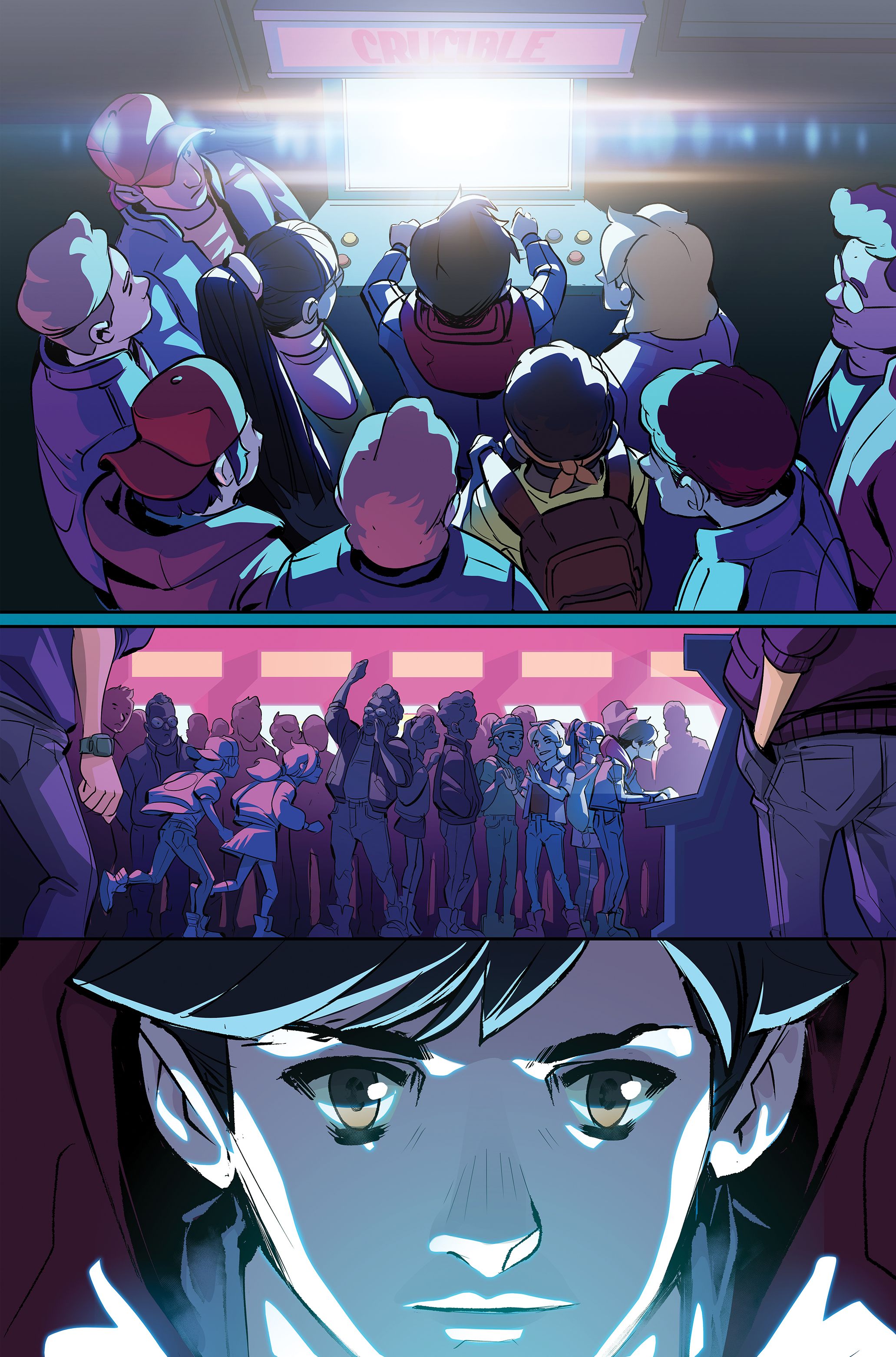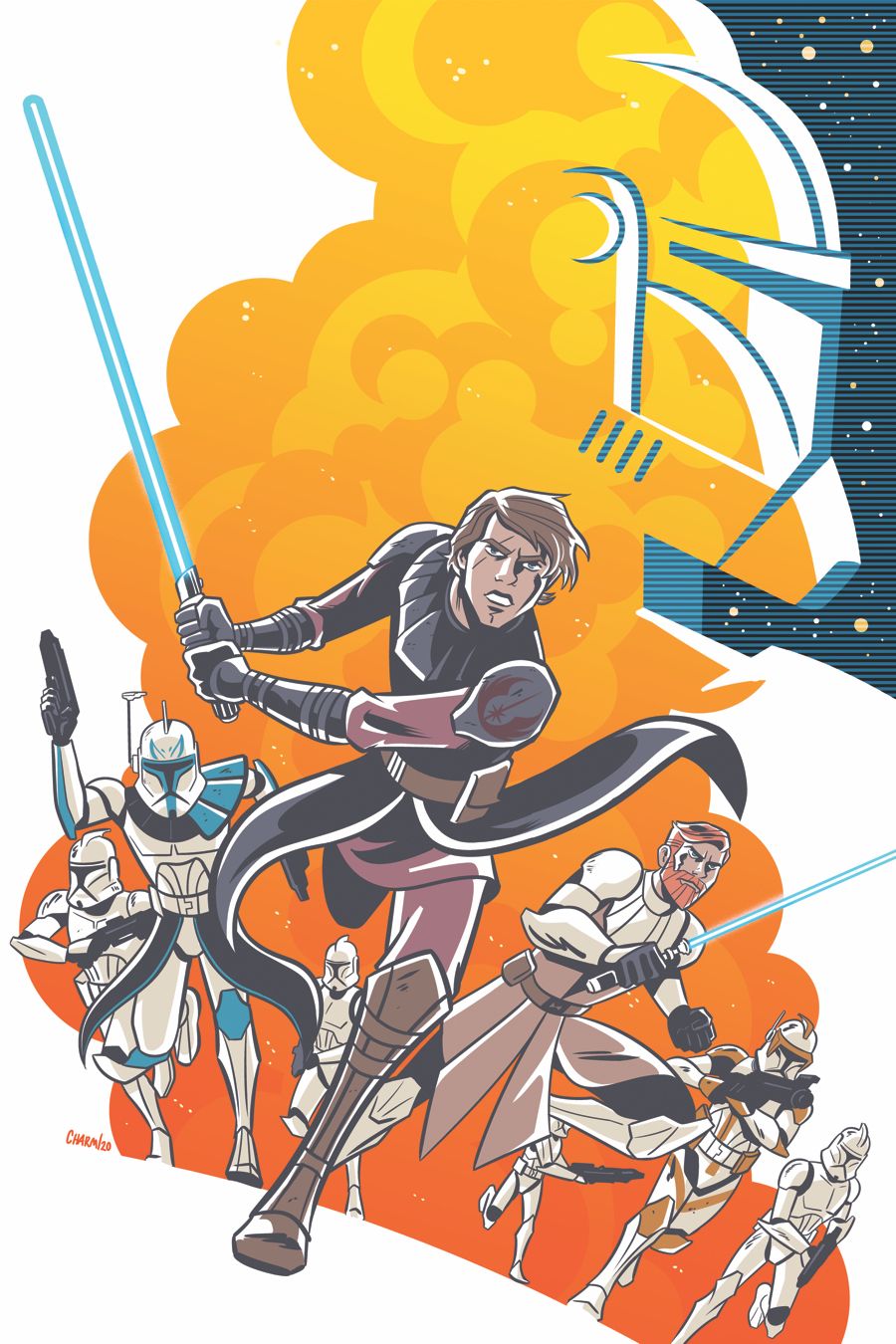As new comic book publisher Impact Theory continues to make waves with its expanding library, pairing fan-favorite writers and artists with popular recording artists, the publisher's second series, Hexagon, is poised for a wide release next month. Written by Michael Moreci, Impact Theory founder and CEO Tom Bilyeu and electronic artist Don Diablo, and illustrated by Jheremy Raapack, the new series received a timed exclusive release at New York Comic-Con this past October before its retail debut on March 18.
The series follows a young boy named Don who disobeys his father to run off to the local video game arcade. Playing the notoriously difficult game Crucible, Don's innate skills lead him to be roped into a larger sci-fi adventure that sends the boy across the cosmos and into an epic, interplanetary conflict.
In an exclusive interview, Moreci discussed working with Bilyeu and Don Diablo, his deep love of the sci-fi genre and teased his upcoming comic book miniseries Star Wars: The Clone Wars -- Battles Tales, with IDW Publishing.
CBR: Let's get the biggest question out of the way first: How has been crafting the world of Hexagon with Don Diablo and Tom Bilyeu?
Michael Moreci: It's been great! You know, I really looking forward to being welcomed onto this project alongside two guys who both have pretty remarkable and unique visions. So being able to build a world with these two really great minds is pretty cool; we've all been bringing our best ideas, it was a really, really great experience.
Something I've always loved about your work is you look at Image Comics' Roche Limit, you look at the prose novel Black Star Renegades, you look at Hexagon: They're all sci-fi but in very different ways. Roche Limit is high concept, Black Star Renegades is a love letter to Star Wars. What aspect of sci-fi does Hexagon address?
I think there are two impulses. One, we were very focused on making this book a kid's book; something for 8-14 year-olds, in that ballpark. We really had to wrap our minds about what kind of sci-fi is digestible in that age range, what they're going to enjoy, what they can handle. Kids don't get enough credit for being as sharp as we may think, and I'm saying that as a dad.
We also wanted to make the sci-fi we really liked when we were kids [ourselves]; not just recreate the stuff from our childhood but think about the sci-fi stuff that we loved and worked for us as touchstones, especially stuff like The Last Starfighter. There's a lot of kind of movies and stories in that vein about a boy or girl that steps into a larger world or bigger adventure and has all these things that expose them to a bigger universe and conflict but also keeps the story small and close to this character giving them the room to mature with it. This story is a coming-of-age tale where they learn something like bravery or perseverance and about their true selves within the story. That's what resonated so deeply with me, Tom and Don.
You were saying you're a father yourself. How has it been getting in [the protagonist] Don's headspace as a kid that rebels against his father to run off to the arcade?
I think it's cool. The thing I learned about being a parent is that kids want and need to push past their boundaries. They have this weird relationship that they crave and need boundaries but they also want to push back against them. This character, Don, is fundamentally at heart a really, really good kid and has a close relationship with his dad and wants to make him happy. But he also has other things that he needs to satisfy, like being a part of his group of friends and playing games, and that defies [his relationship with his father]. It's an interesting relationship between kids and parents that I don't think I'd recognize without being a parent myself but that's important.
Part of maturation is pushing back against stuff and finding your own way without your parents there to guide you or help you or tell what or what not to do. That's part of Don's journey, that he took this step on his own and the consequences of this galaxy-spanning story are pretty robust. But it's still a fundamental thing that he made a choice and having to deal with the consequences of that choice. That's something that's really important to kids, being able to do that and deal with whatever the outcomes are.
You've done a lot of work in sci-fi and horror. What is it that keeps you coming back to those genres as a storyteller?
One of the things that always appealed to me is that I like the idea of idea and character-driven storytelling more than plot or plot twists. When I'm developing stories, I want to put these ideas and how they affect the characters. Outer space is a good example because it's so idea-heavy, it's the ideas I like, and it's a very compelling package that's still very entertaining; sci-fi does that. I just love both those genres and grew up on both those genres but they're just a good way to tell these robust stories with big ideas and big characters and big things in these settings.
Thinking specifically about Hexagon, when I was a young boy I liked slice-of-life stories and space adventures; those were the kind of things that held my attention way more than anything else. I needed that draw and that action so we get the same things but in a different way.
As somebody who's written for Image Comics, Vault Comics, IDW Publishing and DC Comics, how has it been writing for Impact Theory?
It's been a great time! Tom has given me tons of freedom and he's a really, really good collaborator. He has a lot of great ideas and he's a good storyteller and he comes from a storytelling background himself. So he's really, really knowledgeable and he's able to lend a really good editorial, guiding hand. And he put me and Jheremy Raapack together; Jheremy's a really, really good artist. So Tom knows how to put together good teams. He knows how to put things together and make things work and I certainly feel like he did it well with Hexagon. He's a great guy to collaborate with and that's what you want: More of a collaborator and less of a boss.
Outside of your past work with Star Wars, I feel like this is the most family-friendly thing you've written so far. Is this something you've written with the hopes that your sons can pick it up and enjoy it, writing for them in a way?
Yeah, for sure; this is definitely something I want them to read and identify with and enjoy. I want there to be more comics like this. I feel like sometimes when you're writing for direct market comics, they try to turn and make comics for kids, like, "Let's make an Avengers comic for kids," but it's still not a kids comic, those characters are still adults with adult problems and experiences. Kids comics are telling stories from kids' perspectives and actually specific to their experiences and lives; I think that's a really important thing and I've come to appreciate that more. So being able to create something like that and hand it to my kids and hopefully they'll glean something important from it for their own development and maturation, that is really important to me and I'm thrilled to be able to do it.
I think this is the first interview you've done since it was announced but you're doing a Star Wars: Clone Wars comic book miniseries with IDW. How has it been getting back into that galaxy far, far away?
I'm thrilled, just absolutely thrilled. I don't know how often this happens but I just went to Lucasfilm and pitched it since I knew [the animated series] Clone Wars was coming back and I knew we had to do something about that. I was partially inspired by Cavan Scott's [IDW miniseries] Return to Vader's Castle, creating this mold of a five-issue weekly miniseries with that framing story and the Clone Wars, you know, covers such a wide span of time; there's tons of adventures and battles you can explore.
So to be able to do something that was my own initiative was really, really satisfying to get through. I think the book is going to be really great, we have such great artists and this is such a great period of Star Wars history, probably one of my favorites and I couldn't be happier to do this.
You've always been a pretty vocal supporter of the prequel trilogy. What is it you think a lot of people miss out on or overlook with those films?
That's a really good question. I think they've started to well, which I'm really gratified by, but I think is that people get caught up in the elements in the prequels that don't work; easy targets like Jar-Jar or lines about sand that get endlessly repeated in our online meme, social media culture. But you take out, like, those five minutes or whatever and you still have an entire movie. There's a lot more there and they really are complex movies that get taken for granted. There's Anakin's story and the failure of the Jedi and the jealousy and how the Jedi were responsible for creating Anakin and his seduction to the Dark Side; there's really deep stuff happening there.
George Lucas' singular vision is spectacular, and I think they're visually stunning movies. But what gets lost is how deep they are and how they're original stories; Episodes VII and VIII are echoes of the original trilogy. So the prequel trilogy was its own thing and I think that caught a lot of people off-guard; George Lucas wasn't going to go back and play the hits, he was going to create something really unique and really complicated. I think it's harder to readjust expectations and appreciate the prequels for what they are and not how we want them to be. Once you get to that place, it's such a satisfying story and such a satisfying achievement and I think it's the last tentpole franchise we're going to get with one person's singular vision. You don't get that from Marvel or DC or even Star Wars anymore; it was just George Lucas uncompromisingly doing it and we should cherish it for that reason alone.
Written by Michael Moreci, Tom Bilyeu and Don Diablo and illustrated by Jheremy Raapack, Hexagon #1 goes on sale March 18 from Impact Theory.

